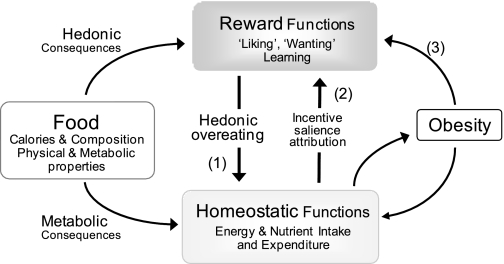Fig. 2.
Relationship between metabolic and hedonic controls of food intake and energy balance. The metabolic consequences of food are regulated by homeostatic functions and the hedonic consequences by reward functions. Hedonic and metabolic consequences are interdependent in that the hedonic value of food modulates caloric intake (1), and the metabolic status modulates hedonic processing (2). The obese state is associated with altered reward functions, but it is not clear whether these changes are the cause or consequence of obesity. Altered reward functions could cause obesity via increased intake of calories or fat (1), or alternatively, could result from consequences of the obese state (3), or could be a combination of both.

